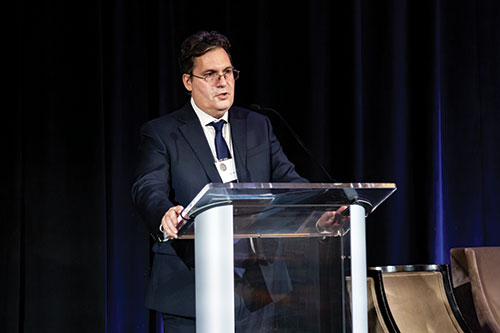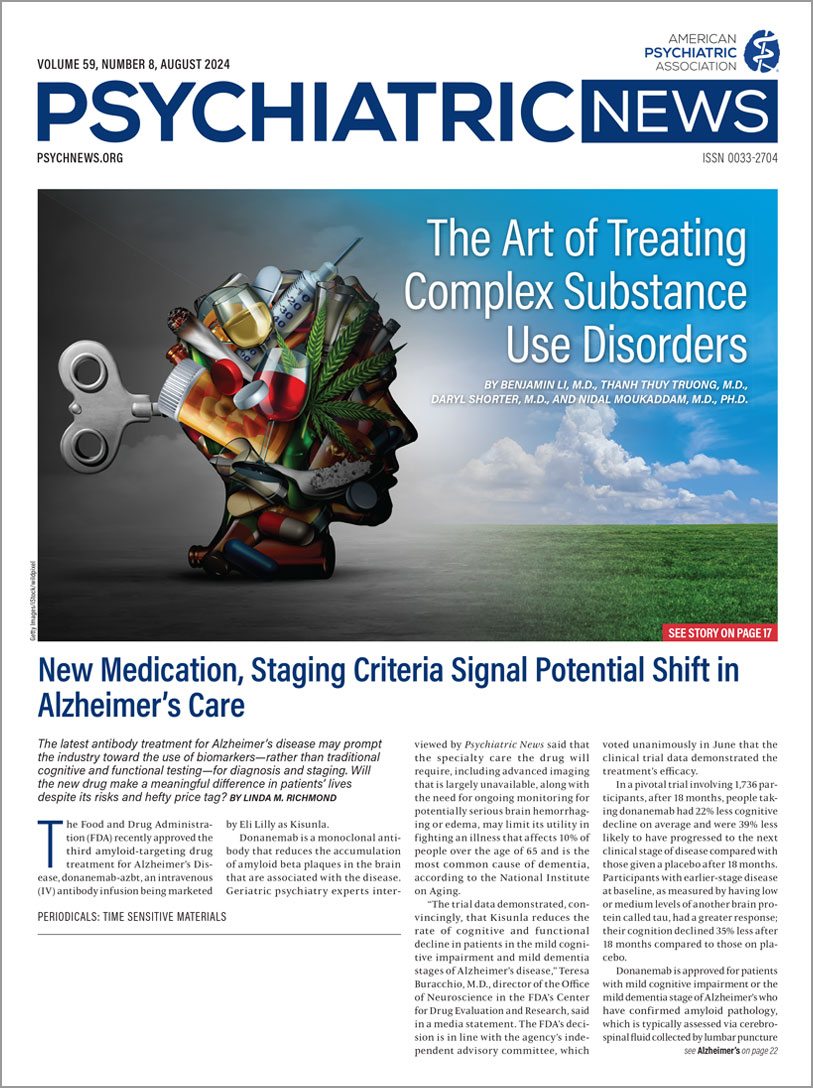In 1950, the newly formed Washington Psychiatric Society (WPS) held its first social event in the terrace room of National Airport (now Ronald Reagan Washington National Airport).
Why the airport?
“Our understanding is that it may have been one of the few places in the area where non-segregated events could take place,” said WPS President-elect Enrico Suardi, M.D., recalling the event at the WPS 75th Anniversary Gala Celebration in Washington, D.C., in April. In just this way has the struggle to transcend racial boundaries and their intergenerational effects on social determinants of health marked the history of the WPS, founded in January 1949. One of its original members was Black psychoanalyst and human rights advocate Charles Prudhomme, M.D., who would later be elected APA vice president in 1970. Last year, the WPS created an award in his honor: the Dr. Charles Prudhomme Human Rights Award. The first award was presented at the gala to Ruth Shim, M.D., M.P.H., the Luke and Grace Kim Professor in Cultural Psychiatry and associate dean of diverse and inclusive education at the University of California, Davis School of Medicine.
“We need to be brave about using our voices as psychiatrists to counter injustice in society,” Shim told WPS members. She recounted her visit to the National Museum of African American History and Culture on the National Mall in Washington, D.C., the day of the gala. One of the quotations on the museum’s walls that caught her attention was from author and civil rights activist James Baldwin: “The great force of history comes from the fact that we carry it within us, are unconsciously controlled by it. History is literally present in all that we do.”
Shim said Baldwin’s comment speaks powerfully to the nature of structural racism—the way inequities today are rooted in historical injustices—and to the courage required to change those structures. But she cautioned that in all human affairs, and especially in matters regarding race and racism, there is a persistent dynamic of progress followed by retrenchment. “We should not despair when we see retrenchment,” Shim said remembeing another striking comment, from crusading journalist Ida B. Wells, memorialized at the African American history museum: “The way to right wrongs is to turn the light of truth upon them.”
“Dr. Shim’s inaugural address was inspiring, reminding all of us to continue to fight for equity and justice for our patients and for society,” said WPS President Anne Marie Dietrich, M.D. “This will involve the re-engagement of psychiatry in society. Our celebration of 75 years of advocacy is just the jump start we need.”
Past WPS President Eliot Sorel, M.D., co-chair of the Dr. Charles Prudhomme Human Rights Award Committee, said the award is “intended to honor individuals and/or organizations who have demonstrated, through their courageous actions, a continued and successful commitment to advocating for human rights regarding health and education affecting historically marginalized individuals, families, and organizations.”
While doing research for APA’s Chester Pierce Award for Human Rights, Sorel had learned of Prudhomme’s work in APA, his steadfast advocacy for human rights, and his collaboration with Pierce and others in the founding of the Black Psychiatrists of America in 1969. Sorel and Constance Dunlap, M.D., Area 3 Council representative to the APA Assembly, jointly proposed the creation of the award. In March of last year, the WPS Board of Directors, led by Dietrich, then WPS president-elect, unanimously
approved the award.
“1949 was a big year for Dr. Prudhomme,” Dunlap, co-chair with Sorel of the award committee, said at the gala. “Not only was he instrumental in the founding of WPS, that year he began training at the Washington Psychoanalytic Institute. He graduated in 1956, a time when Black psychoanalysts were scarce.
“Historically, organized medicine has often been insensitive and tone-deaf to the experiences and contributions of marginalized groups,” Dunlap said. “A prime example is APA’s refusal to support the
Brown v. Board of Education decision in 1954, which desegregated public schools. Fortunately, in 2021, APA issued a
formal apology for structural racism in psychiatry. While a significant gesture, it’s merely a first step.” (Prudhomme had urged APA to sign an amicus brief in support of the plaintiffs in
Brown.)
Dunlap said the Prudhomme award is intended to carry that work forward. “Dismantling social structures that create health inequities remains the work ahead of us,” Dunlap said. “Today, we know that inequities in health arise because of the circumstances in which people are born, grow, live, learn, work, and age, and because of the systems put in place to prevent and deal with illness.”
In introducing Shim, Dunlap noted that she is an internationally recognized expert on social determinants of mental health, cultural psychiatry, and racism and mental health. Shim is a member of the Board of Trustees of the Robert Wood Johnson Foundation; the National Academies of Sciences, Engineering, and Medicine Forum on Mental Health and Substance Use Disorders; and the National Academies Committee on
Unequal Treatment Revisited: The Current State of Racial and Ethnic Disparities in Health Care.
“We are deeply honored to recognize Dr. Shim’s exceptional contributions as a scholar and advocate,” Dunlap said. “Her values reflect those that Dr. Prudhomme championed throughout his life and work and that paved the way for a more equitable future in mental health care.”
The anniversary celebration also included a poster competition in which psychiatry residents in the Washington, D.C., area presented projects in clinical research and public health and a case history and remarks from then incoming APA President Ramaswamy Viswanathan, M.D., Dr.Med.Sc., on “Lessons Learned From My Professional Journey in the APA and My Vision for the Future.” ■


